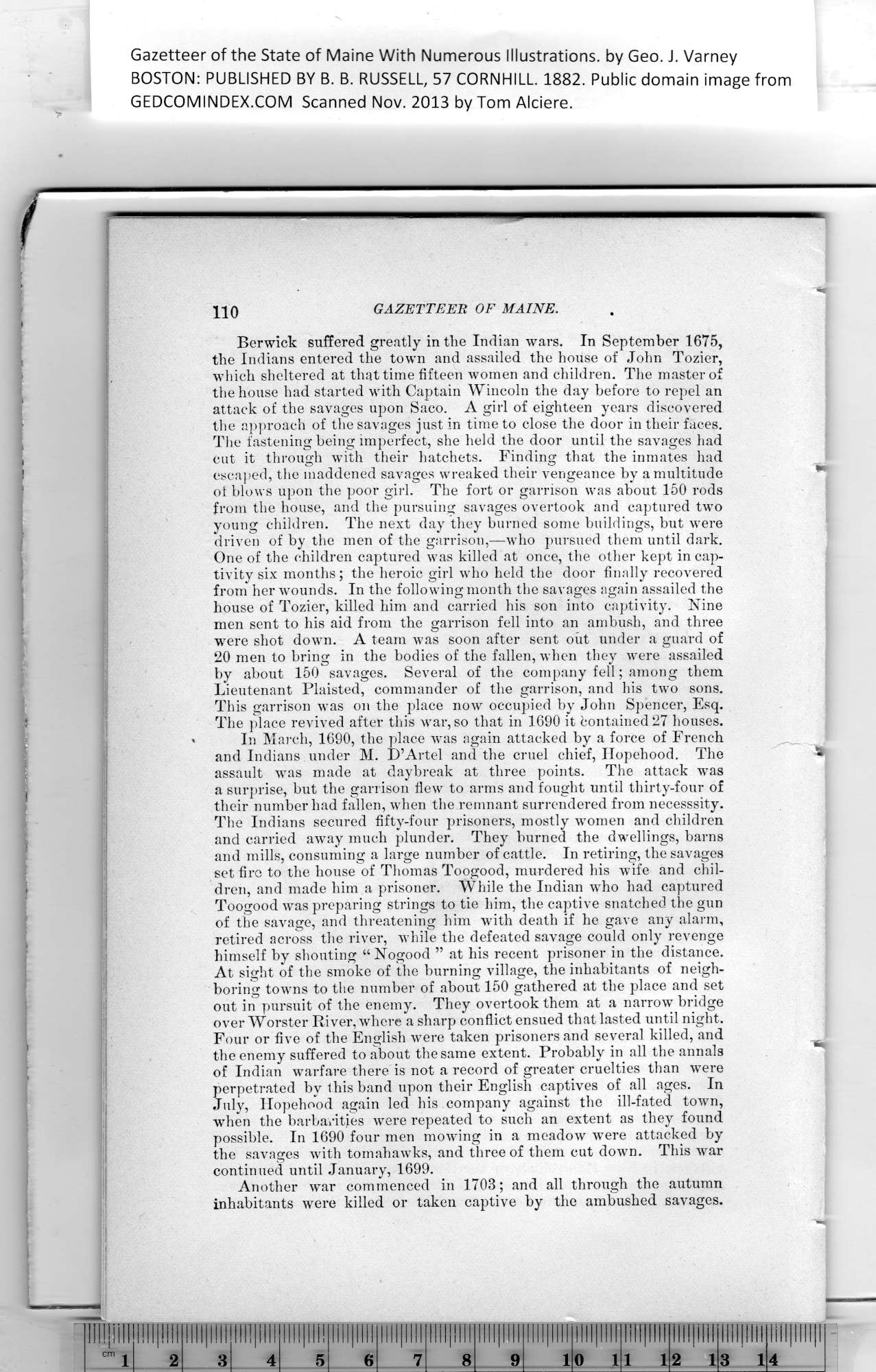|
Gazetteer of the State of Maine With Numerous Illustrations, by Geo. J. Varney
BOSTON: PUBLISHED BY B. B. RUSSELL, 57 CORNHILL. 1882. Public domain image from
GAZETTEER OF MAINE.
Berwick suffered greatly in the Indian wars. In September 1675,
the Indians entered the town and assailed the house of John Tozier,
which sheltered at that time fifteen women and children. The master of
the house had started with Captain Wincoln the day before to repel an
attack of the savages upon Saco. A girl of eighteen years discovered
the approach of the savages just in time to close the door in their faces.
The fastening being imperfect, she held the door until the savages had
cut it through with their hatchets. Finding that the inmates had
escaped, the maddened savages wreaked their vengeance by a multitude
of blows upon the poor girl. The fort or garrison was about 150 rods
from the house, and the pursuing savages overtook and captured two
young children. The next day they burned some buildings, but were
driven of by the men of the garrison,—who pursued them until dark.
One of the children captured was killed at once, the other kept in cap-
tivity six months; the heroic girl who held the door finally recovered
from her wounds. In the following month the savages again assailed the
house of Tozier, killed him and carried his son into captivity. Nine
men sent to his aid from the garrison fell into an ambush, and three
w7ere shot down. A team was soon after sent out under a guard of
20 men to bring in the bodies of the fallen, when they were assailed
by about 150 savages. Several of the company fell; among them
Lieutenant Plaisted, commander of the garrison, and his two sons.
This garrison was on the place now occupied by John Spencer, Esq.
The place revived after this war, so that in 1690 it contained 27 houses.
In March, 1690, the place was again attacked by a force of French
and Indians under M. D’Artel and the cruel chief, Hopebood. The
assault was made at daybreak at three points. The attack wras
a surprise, but the garrison flew to arms and fought until thirty-four of
their number had fallen, when the remnant surrendered from necesssity.
The Indians secured fifty-four prisoners, mostly women and children
and carried away much plunder. They burned the dwellings, barns
and mills, consuming a large number of cattle. In retiring, the savages
set fire to the house of Thomas Toogood, murdered his wife and chil-
dren, and made him a prisoner. While the Indian who had captured
Toogood was preparing strings to tie him, the captive snatched the gun
of the savage, and threatening him wdth death if he gave any alarm,
retired across the river, while the defeated savage could only revenge
himself by shouting “Nogood ” at his recent prisoner in the distance.
At sight of the smoke of the burning village, the inhabitants of neigh-
boring towns to the number of about 150 gathered at the place and set
out in pursuit of the enemy. They overtook them at a narrow bridge
over Worster River, where a sharp conflict ensued that lasted until night.
Four or five of the English were taken prisoners and several killed, and
the enemy suffered to about the same extent. Probably in all the annals
of Indian warfare there is not a record of greater cruelties than were
perpetrated by t his band upon their English captives of all ages. In
July, Hopehood again led his company against the ill-fated town,
when the barbarities were repeated to such an extent as they found
possible. In 1690 four men mowing in a meadow wTere attacked by
the savages with tomahawks, and three of them cut down. This war
continued until January, 1699.
Another war commenced in 1703; and all through the autumn
inhabitants were killed or taken captive by the ambushed savages.
PREVIOUS PAGE ... NEXT PAGE
This page was written in HTML using a program written in Python 3.2
|
